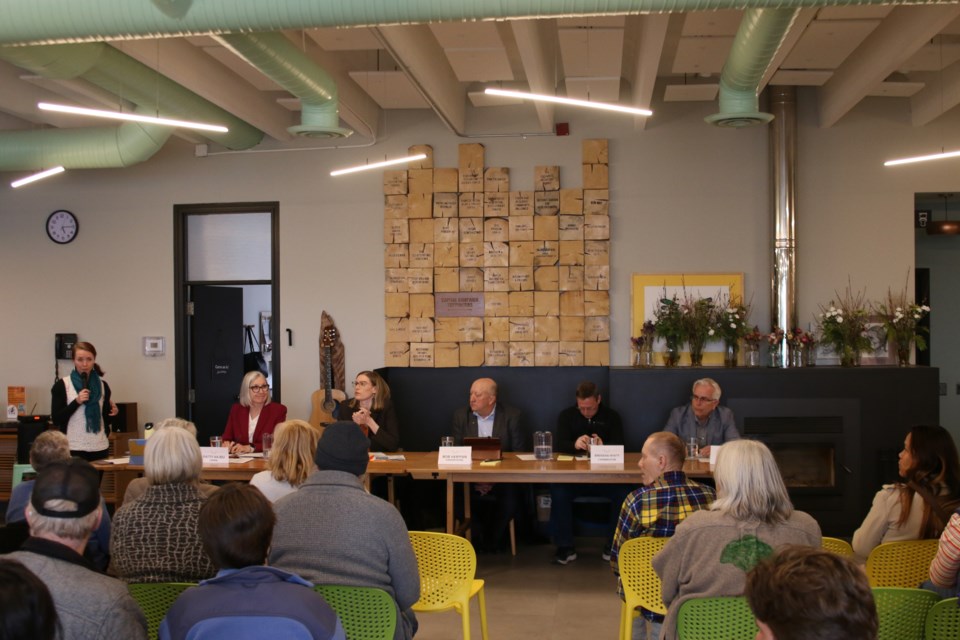THUNDER BAY — Over 40 residents put their questions on food access to the Conservative, Liberal and NDP candidates on Thursday.
Peoples Party of Canada and the Green Party candidates could not attend the Eat Think Vote conversation event hosted at the Roots Community Food Centre.
“I think it’s important for the community to feel like they have a relationship with their candidates and there isn’t a lot of other opportunities to do that for this election because it’s such a short turnaround,” said Katie Watson, the Roots Community Food Centre’s advocacy director.
She said they invited all registered candidates for the federal election to meet with community members in a safe space to answer important questions on food insecurity, local food systems and Indigenous food sovereignty.
One question for candidates was how the parties would support the ideals of food sovereignty as part of international relationships alongside foreign policy and trade.
While there is always a very important conversation about how much foreign aid should be reduced, said Patty Hajdu, the incumbent Liberal candidate, Canadians have watched the United States pull out of foreign aid and seen the cruelty of what happens when you let the world starve: “It isn’t global stability, folks. It’s increased war. It’s increased unpredictable and dysregulated migration.”
“To say that we can actually be safe in Canada while removing ourselves from the entire distress of the world for me is very shortsighted. It’s certainly cruel, but it is actually dangerous,” said Hajdu.
“... We need to have a robust foreign aid program and that includes working with partners to make sure that countries have what they need, so that food does get distributed, so that women get reproductive services (and) so that actually families get the care that they need.”
NDP candidate Joy Wakefield added that defending supply management will also apply when looking at trade agreements and things similar, ensuring that Canadian farmers are protected in negotiations and not filling them out.
“We have enough food in the world to feed everyone, but we don’t and I echo those comments that it’s concerning,” said Wakefield.
“We heard, previously, the comment that in a first-world country, no one should go hungry. I would say there shouldn’t be first-world countries and third-world countries and nobody should go hungry in any country anywhere in the world.”
Bob Herman, the Conservative candidate, said he never once said that Canada should reduce foreign aid - instead Canadians should look at where it is spent.
“We’ve had 10 years of Liberal policy that has inhibited development in our country from a resource base that would have made us strong, would have made us a lot more resilient against these tariffs,” said Herman.
“We have to look at those options and we have to be serious about them because if we don’t, we will still be dependent on one country or our economy, and we cannot survive on that. We have to diversify our markets.”
The Liberals and Conservatives also addressed barriers to Indigenous peoples managing the food on their territories, including harvesting and selling food.
Canada signed treaty rights with the Indigenous peoples, said Brendan Hyatt, so treaty rights need to be respected and honoured alongside Indigenous ways of knowing and learning: “We need to learn from them so that they do have food sovereignty.”
“They need to have the right to actually deal with the food sovereignty themselves. We need to get out of their way,” said Hyatt.
“They’ve been dealing with food sovereignty and gathering and hunting and fishing long before confederation, long before European contact. And they’re the experts and we need to work with them, but to work with them, we actually need to actually provide the resources that they require. That they tell us that they need.”
Mark Powlowski, the Liberal candidate, said the government’s Nutrition North has programs to address specifically using traditional food harvesting and supporting it in Indigenous communities.
“Traditionally, the Indigenous communities fed themselves. They have the ability. They have the knowledge. I think we should help them and providing the necessary funds to expand these programs,” said Powlowski.
No NDP representative from the Thunder Bay-Atikokan riding was available to speak on the matter.
Charles Levkoe, a Canada research chair in equitable and sustainable food systems, moderated these questions submitted in advance by the community.
He said it’s really important that everyone pays attention to what’s currently going on during the election, whether locally or internationally, and gets out there to vote and have their voice heard.
“When we get upset or frustrated or angry about issues in our community that we want to change, like the incredibly high amounts of food insecurity or people that don’t have access to food here or poverty, we can deal with that in little pieces,” said Levkoe.
“We can have a new program or a new initiative, but really if we want to make real change and transform things. We have to get involved in policy (and) in governance issues.”
Other issues raised at the forum included mitigating food insecurity, addressing the impacts of climate change on Canada and local food systems and supporting Northwestern Ontario’s regional harvesting, storage and food distribution capacity.



